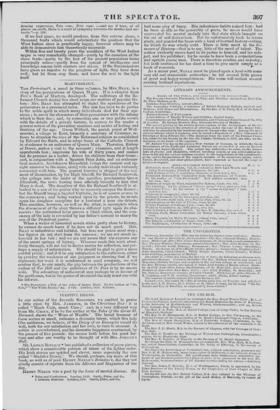MARTYROLOGY.
THE Protestant*, a novel in three volumes, by Mrs. BRAY, is a story of the persecutions of Queen MARY. It is a chapter from Fox's Book of Martyrs, developed. The sufferings of the Re- formed Church during this short reign are matters of popular his- tory: Mrs. BRAY has attempted to depict the operations of the persecutors in a provincial town. Her aim has been to do justice to the noble spirit in which many individuals died for their opi- nions ; to cover the characters of their persecutors with the infamy which is their due ; and, by connecting one or two public events with the details of a private history, to convey to the reader a general notion of the prevailing manners and mocks of feeling and thinking of the age. Owen Wilford, the parish priest of Well- minster, a village in Kent, formerly a secretary of Cranmer, re- fuses to abandon the rites of the Reformed religion as established by Edward the Sixth, and to adopt those of the Catholic Church in obedience to an ordinance of Queen Mary. Thornton, Bishop of Dover, makes a visit to the recusant ; examines, and at length apprehends him ; imprisons his wife of thirty years, and makes her do penance as a harlot ; drives his children from their home ; and, in conjunction with a Spanish Friar John, and an ecclesias- tical monster, Archdeacon Haipsfield, brings the ancient and up- right minister to the stake, along with sundry individuals variously connected with him. The general burning is stopped at the mo- ment of illumination, by the High Sheriff, Sir Richard Southwell, who gallops into the midst of the sacrifice, proclaiming Queen Elizabeth, the news having been officially brought to him that Mary is dead. The daughter of this Sir Richard Southwell is at- tached to a son of the pastor who so narrowly escapes the flames ; but the Sheriff being a bigoted Catholic, he is of course averse to the connexion ; and being worked upon by the priests, he insists upon his daughter accepting for a husband a man she detests. This sacrifice, however, as well as the other, is incomplete when the tknortement of the story'throws a different light upon its cha-, meters : the authorized lover proves a black villain, and the con- stancy of the lady is rewarded by her father's consent to marry the some of the Protestant pastor. When a writer of historical novels sticks pretty close to history, he cannot do much harm if he does not do much good. Mrs.' BRAY is industrious and faithful, but here our praise must stop ; her figures do not start from the canvass ; we are not much in- terested in her tale ; and we are not aware that she exposes any of the secret springs of history. Whoever reads this work atten-. tively through, will not fail to derive matter for reflection, and per- haps a supply of information. We should be glad to give a more cordial praise ; and if it he any satisfaction to the authoress, either by proving the weakness of our judgment or showing that if we depreciate her work it is condemned in good company, we will confess that, to our minds, the gap between the productions of the author of Tor Hill and the authoress of De Foix is by no means wide. The advantage of authorcraft may perhaps be in favour of the gentleman, but in the genius of invention the lady is not one whit his inferior.
* The Protestant, a Tale of the reign of Queen Mary. By the Author of "De Foix," "The White Hoods," &e. 3 vols. London, 1825. Colburn.


















 Previous page
Previous page